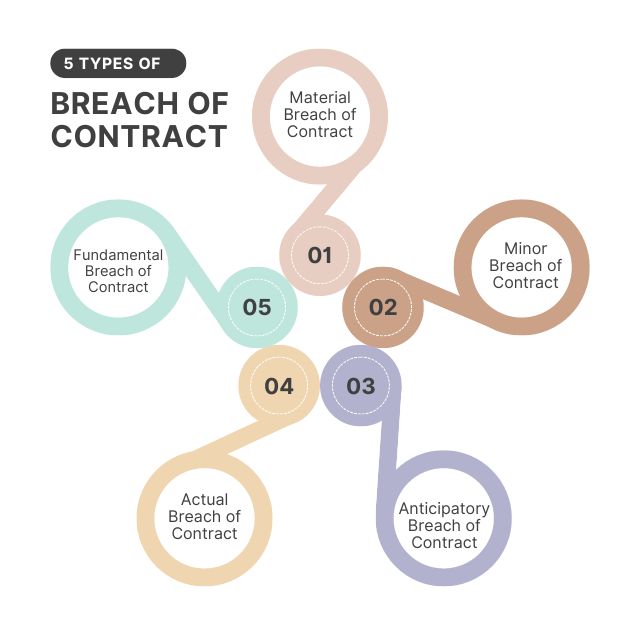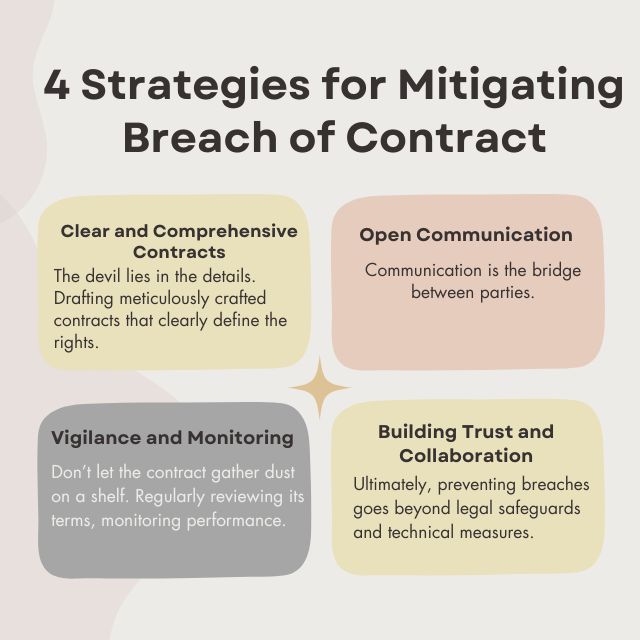In the intricate dance of business transactions, contracts serve as the choreography, meticulously outlining the steps each party must take to ensure a harmonious conclusion. Yet, just as a misstep can throw off a carefully planned routine, a breach of contract can disrupt business dealings, leading to a tangled mess of legal entanglements, financial losses, and strained relationships. This article delves deep into the world of breach of contract, dissecting its different forms, analyzing its consequences, and offering practical strategies for prevention and remediation.
The Foundation of Agreements: Contracts and Their Importance
Imagine a world without blueprints – buildings would emerge as chaotic structures, devoid of purpose and stability. Similarly, without contracts, business interactions would descend into disarray, lacking the clarity and predictability essential for mutual success. Contracts provide the essential framework, stipulating the rights and responsibilities of each party involved. They serve as a roadmap, guiding the journey towards a shared goal. Understanding the concept of breach of contract, therefore, is akin to learning the language of this roadmap, empowering businesses to identify deviations and chart a course of correction.
What is a Breach of Contract?
Contracts are the backbone of business dealings. They are used to establish legally binding agreements between parties, ensuring that each party can hold the other accountable for meeting their obligations. However, sometimes, one or both parties fail to meet the terms of the contract, leading to a breach of contract. This can have serious consequences, ranging from financial losses to damage to reputations. In this article, we will take a closer look at what is a breach of contract and what are different types of breach of agreements and how they can affect businesses.
Before diving into the different types of breach of contract, it is essential to understand what constitutes a contract. A contract is an agreement between two or more parties, where each party agrees to perform certain actions or provide specific goods or services. A contract can be verbal or written, and it is essential to ensure that the terms of the contract are clearly defined to avoid misunderstandings and consequences of breach of contract.
Also Read: Signature guarantee vs notary
What are the Different Types of Breach of Contract ?
Now, let’s explore the different types of breach of contract.

- Material Breach of Contract Occurs when one party fails to meet a significant or essential term of the contract, leading to the termination of the contract.
- Minor Breach of Contract Occurs when one party fails to meet a non-essential term of the contract, but the contract remains in force.
- Anticipatory Breach of Contract Occurs when one party indicates that they will not fulfill their obligations under the contract before the performance is due.
- Actual Breach of Contract Occurs when one party fails to meet their obligations under the contract at the time performance is due.
- Fundamental Breach of Contract Similar to a material breach, it involves a failure to meet a significant term of the contract, but with additional legal consequences.
A breach of contract can have severe consequences for businesses. It can lead to financial losses, damaged reputations, and even legal action. Therefore, it is crucial to understand the different types of breach of contract to mitigate risks and protect your business.
Also Read: What can contract management software ensure
What is a Material Breach of Contract?
A material breach is the most severe type of breach of contract. It occurs when one party fails to meet a significant or essential term of the contract, which affects the overall purpose of the contract. In this case, the non-breaching party is entitled to terminate the contract and seek damages for any losses incurred as a result of the breach. The non-breaching party may also seek specific performance, which is a court order requiring the breaching party to perform the terms of the contract.
Also Read: Can I notarize for a family member in NY
What is a Minor Breach of Contract?
A minor breach occurs when one party fails to meet a non-essential term of the contract. This type of breach does not affect the overall purpose of the contract, and the contract remains in force. However, the non-breaching party is entitled to seek damages for any losses incurred as a result of the breach.
Also Read: Contract administration vs contract management
What is an Anticipatory Breach of Contract?
An anticipatory breach occurs when one party indicates that they will not fulfill their obligations under the contract before the performance is due. This type of breach allows the non-breaching party to terminate the contract and seek damages for any losses incurred as a result of the breach. The non-breaching party may also seek specific performance.
Also Read: What is CLM
What is an Actual Breach of Contract?
An actual breach is the most common type of breach of contract. It occurs when one party fails to meet their obligations under the contract at the time performance is due. The non-breaching party is entitled to seek damages for any losses incurred as a result of the breach. The non-breaching party may also seek specific performance if the breach is significant enough.
Also Read: How to write a Contract Proposal
What is a Fundamental Breach of Contract?
A fundamental breach is similar to a material breach, in that it involves a failure to meet a significant term of the contract. However, it has additional legal consequences. In this case, the non-breaching party is entitled to terminate the contract and seek damages for any losses incurred as a result of the breach. The non-breaching party may also seek specific performance.
Also Read: Adding an addendum to a contract
The Sting of Broken Promises: Consequences of Breach
A breach of contract, irrespective of its type, leaves a bitter sting. The consequences, like ripples in a pond, spread outwards, impacting both parties in multifaceted ways:
- Financial Losses: Breaches can drain the well of profitability. Lost revenue, wasted resources, and expenses incurred to rectify the situation can severely impact the financial health of both parties.
- Legal Disputes: Breaches often spawn legal battles, leading to costly litigation and consuming valuable time and resources. What should have been a smooth collaboration transforms into a courtroom clash, eroding goodwill and trust.
- Reputational Damage: A tarnished reputation is a heavy burden to bear in the business world. Breaches can paint a picture of unreliability and incompetence, jeopardizing future partnerships and opportunities.
Seeking Justice and Closure: Legal Remedies for Breach
When faced with a breach, the non-breaching party is not left powerless. A legal arsenal awaits, offering various avenues for recourse:
- Damages: This is the financial remedy, an award of compensation to offset the losses suffered due to the breach. Damages can be compensatory, aiming to restore the non-breaching party to its pre-breach position, or punitive, meant to punish the breaching party for its misconduct.
- Specific Performance: In some cases, the court may order the breaching party to fulfill its contractual obligations precisely as outlined. This remedy is most appropriate when monetary compensation cannot adequately address the non-breaching party’s needs.
- Rescission: This option nullifies the contract entirely, returning both parties to their pre-contractual positions. It allows for a clean break when the breach renders the contract impossible or impractical to perform.
Prevention is the Best Medicine: Strategies for Mitigating Breach of Contract
While legal remedies offer solace after the storm, it is far wiser to build sturdy walls before the rain falls. Here are some proactive measures to minimize the risk of breach:

- Clear and Comprehensive Contracts: The devil lies in the details. Drafting meticulously crafted contracts that clearly define the rights, duties, performance expectations, and dispute resolution mechanisms is crucial. Ambiguity is the breeding ground for misunderstandings and potential breaches.
- Open Communication: Communication is the bridge between parties. Fostering open and transparent communication channels allows for early identification and resolution of any issues that may arise, preventing them from snowballing into full-blown breaches.
- Vigilance and Monitoring: Don’t let the contract gather dust on a shelf. Regularly reviewing its terms, monitoring performance, and promptly addressing any deviations serve as an early warning system against potential breaches. Proactive engagement fosters a sense of accountability and ensures both parties stay on track.
- Building Trust and Collaboration: Ultimately, preventing breaches goes beyond legal safeguards and technical measures. It hinges on fostering trust and a collaborative spirit. By treating each other with respect, acting in good faith, and working together towards shared goals, parties can create an environment where breaches are far less likely to occur.
Safeguarding Agreements, Securing Success
Breach of contract, while a formidable threat, is not an insurmountable obstacle. By understanding its various forms, recognizing its consequences, and employing effective preventive and remedial strategies, businesses can navigate the complexities of contractual relationships with confidence. Clear communication, meticulous contract drafting, proactive monitoring, and a commitment to collaboration pave the way for a world where agreements are upheld, promises are kept, and shared success becomes the true choreography of business interactions.
Conclusion
In conclusion, breach of contract is a serious issue that businesses must take seriously. It is essential to understand the different types of breach of contract to mitigate risks and protect your business. If you believe that a breach of contract has occurred, it is important to consult with legal counsel to understand your rights and options. By doing so, you can protect your business and ensure that your contracts are enforced as intended.
Also Read: Contract lifecycle management blockchain
Did you find this Legitt article worthwhile? More engaging blogs about smart contracts on the blockchain, contract management software and electronic signatures can be found in the Legitt Blogs section. You may also contact Legitt to hire the best contract lifecycle management services and solutions along free contract templates available in Word and PDF format.
FAQs on Types of breach of contract
What is the difference between a material breach and a minor breach of contract?
A material breach is a significant failure to meet a vital term of the contract, allowing the non-breaching party to terminate the contract and seek damages. A minor breach is a failure to meet a non-essential term of the contract, allowing the contract to remain in force while seeking damages.
Can a contract be terminated due to a breach?
Yes, a contract can be terminated due to a breach if the breach is significant enough, such as a material breach or a fundamental breach. The non-breaching party may also seek damages for any losses incurred as a result of the breach.
Can a party sue for damages as a result of a breach of contract?
Yes, a party can sue for damages as a result of a breach of contract. The non-breaching party is entitled to seek damages for any losses incurred as a result of the breach, such as lost profits or expenses incurred.
What 3 elements must a breach of contract claim?
A breach of contract claim must have three elements:
1. Existence of a valid contract
2. Material breach of the contract
3. Damages resulting from the breach, which can be proven with evidence.
What is the difference between termination and cancellation of a contract due to a breach?
Termination of a contract due to a breach is a legal remedy that allows the non-breaching party to end the contract and seek damages. Cancellation of a contract is a mutual agreement between parties to end the contract, typically without a breach.
What is the most common breach of contract?
The most common breach of contract is a failure to perform as promised. This can include a failure to deliver goods or services as specified, or a failure to pay for goods or services as agreed upon in the contract.
Is a contract legal if it's not notarized?
Yes, a contract can be legally binding even if it is not notarized. A contract is valid as long as it meets the legal requirements of offer, acceptance, and consideration, and the parties intend to be bound by its terms.
Does a smart contract considered as legal binding?
Yes, a smart contract can be considered legally binding if it meets the legal requirements for a contract, such as offer, acceptance, and consideration, and the parties intend to be bound by its terms. Smart contracts are enforceable by law and can be used to automate various aspects of a contract.





















